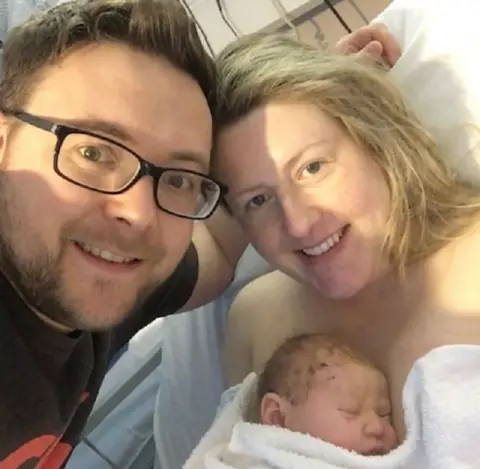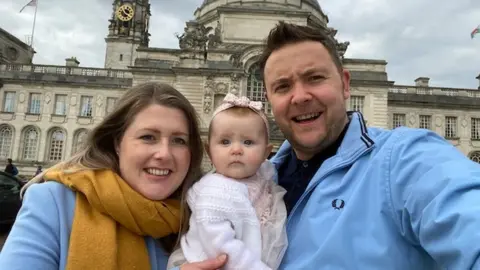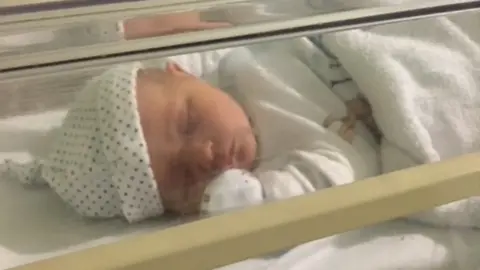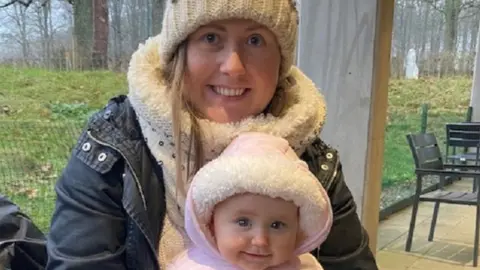Covid rules on hospital visits and maternity appointments relaxed
New Covid guidance for hospitals could see more patients receiving face-to-face visits from loved ones.
NHS Wales has given health boards and hospices flexibility to allow visits based on local levels of Covid-19.
Until now accompanying people to medical appointments and hospital visits have not been allowed, with a few exceptions.
It also allows for pregnant women in low Covid rate areas to take their partners to maternity appointments.
The Welsh Government said the new flexibility was "due to the changing picture of coronavirus transmission across Wales, with significant variations in community transmission across different parts of the country and differences in the rate of nosocomial transmission".
Room sizes, the ability to social distance and infection prevention and control will all be considered when considering visits to maternity wards.
Chief nursing officer for Wales, Jean White, said for women in very low areas of transmission "it would almost be like it was before Covid".
'Bizarre and emotional'
Angharad Phillips from Cardiff was on a maternity ward waiting to give birth to her first child as the first lockdown in Wales was announced in March.
"I just remember lots of women breaking down and crying quite loudly and wailing," she said.
 Family photo
Family photo
The mum of eight month old Eli Gwen considers herself lucky to have had partner Gareth present at the birth but said it was both emotionally and physically difficult when he had to leave 20 minutes after she came out of surgery.
"I had an epidural and so I was immobile and having to pick baby up, shuffle to the edge of the bed, pick her up for feeding and changing when I was struggling already myself," she said.
The 37-year-old, who discharged herself after three days on the ward, said leaving was also surreal.
"It was very much like a chemical warzone. I remember being escorted down off the ward and my partner waiting outside...we looked at each other through the glass," she said.
"I remember thinking this is really bizarre and emotional, I just wanted to run and hug him."
She said she was hugely relieved to learn there will be more flexibility for other families so they can "go through that special moment together".
 Family photo
Family photoMs White said the most noticeable changes would be to maternity services.
"So for a very high risk (area) you may say the woman would only have support during childbirth and the very limited amount of contact with partner in the various stages," she said.
"In a very low area you would almost be like it was before Covid, you would have partner at most appointments and they would be able to stay longer...and allow more visiting and interaction."
'More support'
In other health areas, Ms White said the biggest change was the introduction of essential support assistants.
"If you're coming into hospital for appointments or you're going to be an inpatient, you can have somebody with you, whether that's because you have difficulty understanding information if you need an interpreter, or if you actually need some psychological support for you to cope, you're able to nominate that person.
"It could be a family member."
Health Minister Vaughan Gething said he recognised that the restrictions on visiting has a huge impact on patients, their families and loved ones.
"It is important to remember that the virus has not gone away and the health, safety and wellbeing of patients, communities and NHS staff remain an absolute priority for both the Welsh Government and health care providers," he added.
The director of the Welsh NHS Confederation Darren Hughes said it was "only right that we have the flexibility based on local circumstances in terms of visitors to hospitals where it is safe to do so".
 Family photo
Family photoHe added: "This change gives our members the opportunity to take sensible, evidence-based precautions where necessary and it will also be a boost to patients and families who are desperate to support their loved ones."
'Extremely stressed'
Nadia Higson, from the maternity charity AIMS, said any relaxation was going to be "very welcome".
"We've had a lot of calls and a lot of emails from people feeling extremely stressed about the fact that they are having to attend appointments on their own," she said.
"And the kind of situations [they discuss] are potentially going along and hearing bad news about their baby, potentially hearing that the sonographer can't hear the baby's heartbeat."
She added: "The more that partners are able to be involved to be supporting the women, and be involved themselves in the pregnancy, that can only be good."
 Family photo
Family photo